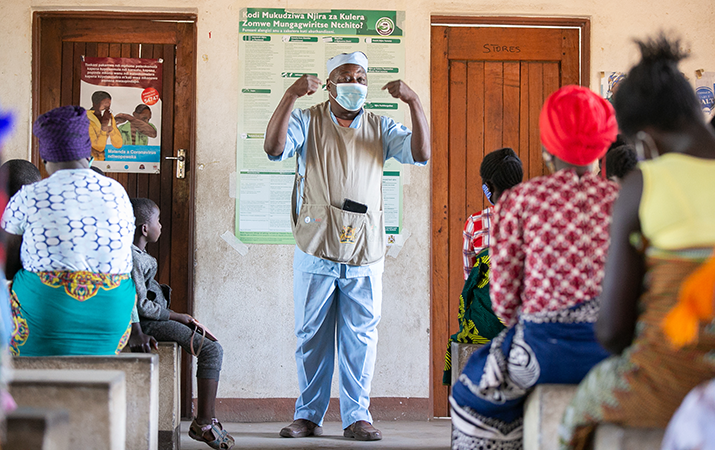USAID ONSE Project is on the Frontlines of Malawi’s Response to COVID-19
USAID ONSE Project is on the Frontlines of Malawi’s Response to COVID-19

On April 2, 2020, Malawi’s President Peter Mutharika confirmed the country’s first cases of COVID-19. The pandemic poses a significant threat to Malawi’s vulnerable health system and requires urgent investments to ensure health workers and communities can mobilize quickly and efficiently to prevent widespread transmission.
The Organized Network of Services for Everyone’s (ONSE) Health Activity, USAID’s flagship program for health service delivery in Malawi, is on the frontlines in supporting USAID’s efforts to mobilize an emergency response action plan in 16 districts, where more than half the population of Malawi lives. This effort is part of the US Government’s response to the coronavirus, assisting countries affected by the outbreak or at high risk of its spread.
The program’s strong district footprint and engagement with the Ministry of Health and Population (MoHP) and other health sector partners has enabled the coordinated and rapid district-led response needed to contain the threat of COVID-19.
More than 1,200 ONSE-supported integrated family health and family planning outreach clinics have reached a quarter-million Malawians with essential health services during the crisis, and higher-level health facilities have limited spread of COVID-19 through strengthened disease surveillance and infection prevention protocols.
The program’s response to the pandemic includes:
Coordination, planning, and monitoring
ONSE facilitates district level coordination, planning, and monitoring for COVID-19 detection, prevention, and response by training and orienting district leadership and rapid response teams. ONSE closes operational gaps, including covering costs and transport for case investigation and contact tracing, for confirmed COVID-19 cases.
Risk communication and community engagement
ONSE integrates risk communication and community engagement through information, education, and counseling activities, including local radio broadcasts, health talks at health facilities, community dialogues, and distribution of printed materials to increase community awareness of COVID-19 and behaviors to prevent its spread.
Infection prevention, control, and case management
ONSE immediately mobilized support to finalize an isolation unit at Kamuzu Central Hospital in Lilongwe, which was handed over to the MoHP on April 15, 2020. This work included conversion of an underused clinic into a screening room, male and female suspect wards, and an expansion to provide bathrooms. ONSE also supports health care workers and staff to implement infection prevention and control (IPC) measures, and reinforce IPC protocols through ongoing maternal and child health focused supportive supervision and mentoring activities. The program provides IPC materials, such as waste bins, chlorine, handwashing soap, buckets with taps, and hand sanitizer, to ensure that essential maternal and child health services can be safely provided at health facilities.
Surveillance, rapid response teams, and case investigation at Malawi’s points of entry
ONSE supports district health teams in conducting screening and infection control and prevention at border points of entry, as well as surveillance of travelers from neighboring high-risk countries. Information regarding COVID-19 transmission, self-quarantine, and other preventive measures is provided to incoming residents.
The ONSE team, led by MSH, is leveraging its experience gained under the rapid response support delivered to fight Malawi’s cholera outbreak of 2018. The activities helped increase the country’s health system capacity and resilience through district-led planning, infection prevention and control, dissemination of social behavior change materials in facilities and communities, and commodity redistribution.
ONSE-supported districts, which cover more than 60% of the population, include: Chitipa, Karonga, Nkhatabay, Nkhotakota, Salima, Dowa, Mangochi, Kasungu, Mchinji, Lilongwe, Ntcheu, Balaka, Zomba, Machinga, Mulanje, and Chikwawa.